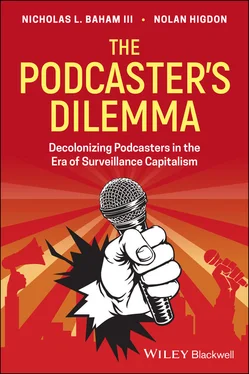Radio and podcasting also differ in terms of their target audience. Where radio producers have traditionally focused on developing content that would attract the largest audience possible, podcasters tend to develop content for smaller or niche audiences. For example, rather than marketing themselves as concerned with any and all issues, podcasts are dedicated to specific themes. Thus, Speak Out with Tim Wise is a podcast focused “on racial and economic justice in the age of Trump.” Another one, titled Mansplaining , describes itself as “a gender-aware explication of hyper-masculinity in popular films.” Where radio and other traditional media offer milquetoast content that avoids controversial topics for a litany of reasons, including fears about alienating audiences, or about Federal Communication Commission (FCC) violations, podcasters are more edgy, both in their use of ribaldry and in their content. For example, they have titles that would be forbidden in traditional media, such as The Manwhore , Guys We Fucked , and CockTales: Dirty Discussions .
As critical scholars and podcasters, we were aware that media producers use the podcasting space for decolonization. Upon closer examination, we discovered that there is a dearth of research concerning the ways in which underprivileged communities utilize podcasting as a space of decolonization. Most of the scholarship on podcasting so far has focused on uses in educational settings. 14The present study seeks to contribute to the field by advancing our understanding of podcasting as a space of decolonization across a broad spectrum of social, cultural, and political settings.
Our review of the scholarship revealed that podcasting holds an important place in the long and well-documented history of radio. 15This is particularly clear in the work of Gretchen King, who applied a “de-westernizing and internalizing” framework for mapping the historical evolution of the global community’s radio projects from the early 1900s to the present. King organized her research into four stages: the experimental stage (1900s–1940s); the wildfire stage (1950s–1960s); the solidarity stage (1970s–1980s); and the resurgence stage (1990s to the present). 16King’s experimental stage features the early days of radio broadcasting history, when individuals who experimented with community-based broadcasting contested statal (or military) and commercial domination over the airwaves. 17The wildfire stage covers the rise of unlicensed, clandestine political radio. 18The solidarity phase is characterized by the growth of community radio associations “that shared resources, built up sector capacity, and collaborated in policy advocacy initiatives at the regional and national level.” 19The resurgence phase sees the return of both licensed and pirate community radio, in a direct response to neoliberal budget policies. 20
Podcasting and digital media are not only contemporaneous with the resurgence phase of community radio: they are a digital extension of modern community radio, particularly given their shared critique of and resistance to neoliberalism. Additionally, similar legislation and the growing accessibility of technology, which provided fertile ground for the resurgence of community radio, exist in the space of digital communication. 21With respect to technological access, King notes:
An additional factor aiding the rapid growth of community radio during the Resurgence period was the increasing accessibility and affordability of radio production and distribution technology. Prior to the 1990s, radio stations or producers wanting to share content either required an expensive connection (typically via satellite or high-grade phone line) or relied on shipping recordings through the mail. With the spread of the internet, new websites were launched like Radio4all.netand Archive.org, which went online in 1996, and Indymedia.org, created in 1999, for the free uploading and immediate distribution of audio files. 22
Here King acknowledges the significant overlap between community radio and digital technologies, justifying not only the governing analogy of our project but also the notion that decolonizing podcasts are a contemporaneous outgrowth of the resurgence phase of King’s model, in technology as well as in substance.
Our insistence on the analogous nature of radio and digital communication is supported in much of the emerging critical literature on digital communication. For example, Tiziano Bonini’s analysis of the polymedia intermingling of radio and social media during the 2013 Gezi Park protests in Turkey suggests profound continuities between old and new technologies in resistance and decolonization movements. Bonini writes:
Radio has been employed as a communication tool during all the social movements and protests of the last decades of the past century, from the student movements of May 1968 in Paris and Mexico City to the 1999 Seattle WTO protests, while the political protests and uprisings at the beginning of the twenty-first century have mostly been supported by social media … Is Twitter the radio of the twenty-first century? Another, more complex, reality lies beyond the surface of the representation of the protests shaped by the mainstream media: the mediascape in which political movements such as Occupy, the Arab Spring and the Indignados have emerged is a mixed one, a mediascape where old and new, mainstream and underground media co-exist, interact and shape each other. 23
In 2020 Andrew J. Bottomley documented the stages of podcasting in his book the Sound Streams: A Cultural History of Radio–Internet Convergence , just as King had done for radio. 24Bottomley argues that there are three waves of podcasting. The first wave, from 2000 to 2005, witnessed the unnamed practice of podcasting emerge as an auditory version of the unconventional practice of blogging. The second wave, from 2005 to 2010, introduced repurposed radio content, user-generated round table discussions, and comedic content as podcasting. And the third wave, which began in 2010, saw more in-depth storytelling, which Bottomley credits to the investigative journalism podcast Serial . 25Bottomley argues that in the second wave the term podcasting was coined as a result of an association with the iPod, coupled with Apple’s monopoly of podcasting content at the time. 26Beyond Bottomley, the existing scholarship has been limited to multicontributor volumes about podcast culture and about the popularity and format of podcasts, and to methodological texts for research on podcasts. 27
Critical scholars remind us that power relations are not fixed and that liberation from dominant ideologies is possible through a critical examination of media and power, in a process known as decolonization. 28Chantal J. Zabus explains that decolonization “refers to the shedding of colonial relics inherited from colonial history in all spheres (not only the socio-economic and political), accompanied by an inward-looking, autarkic movement that will lead to the decolonization of mentalities and is tied to economic de-linkage from Western Powers.” 29As Last Moyo notes, in media “the aim of decolonial turn is not to reproduce a new Hegelian hierarchies or new knowledge power structures in the field, but to give birth to a truly multicultural critical media theory that emerges from intercultural and trans-epistemic dialogue between the geographic Northern and Southern epistemologies.” 30
As a field of study, decolonization is rooted in the experience of indigenous peoples. 31Eve Tuck and K. Wayne Yang remind us that decolonization “brings about the repatriation of Indigenous land and life; it is not a metaphor for other things we want to do to improve our societies and school.” 32Colonization is brought about by imperialism, and the malignant settler mentality of empire is anathema to decolonization. 33A colonial mentality is an attitude of ethnic and cultural inferiority that results from colonization. 34Colonial mentalities are hegemonic forces that cause the colonized to internalize the belief that the culture of their colonizer is more valuable than their own. 35Indeed, psychologists have found that the adoption of colonial mentalities is associated with mental health issues such as anxiety and depression. 36Critical media scholars explain that cultural hegemony enables the ruling class to break the psyche of the colonized and enable the internalization of colonial mentalities. 37
Читать дальше












